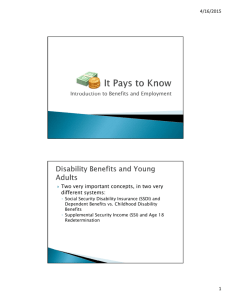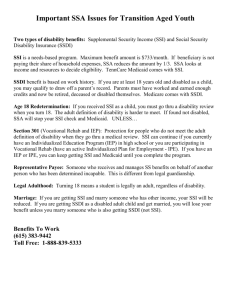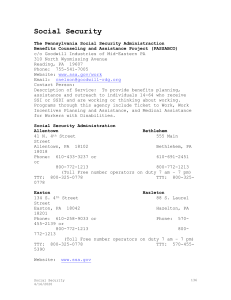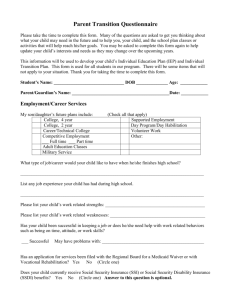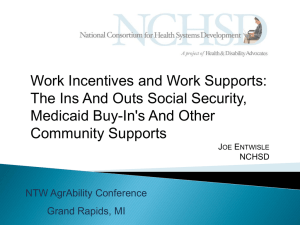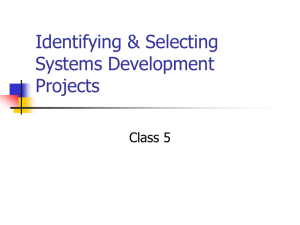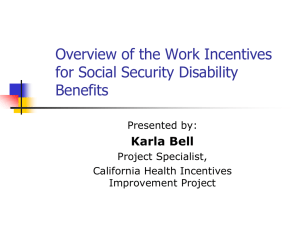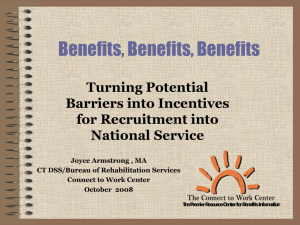Can I work and still receive SSI or SSDI and Medicaid?
advertisement
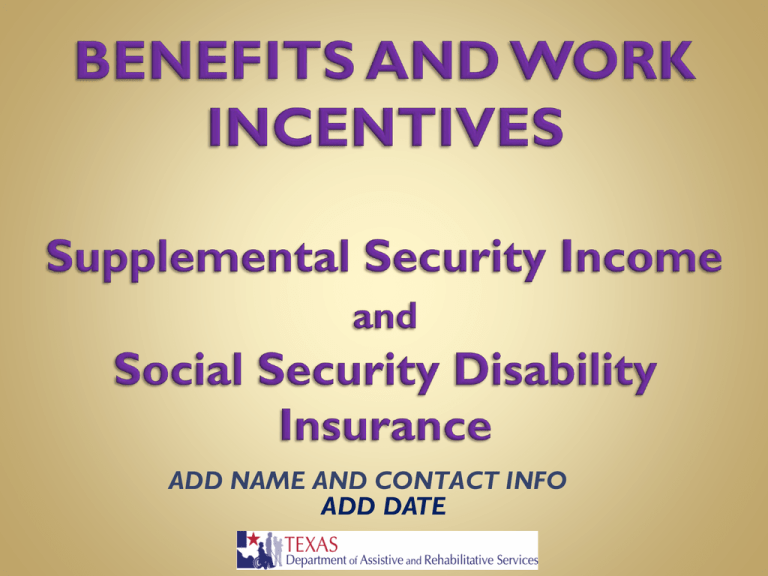
ADD NAME AND CONTACT INFO ADD DATE You are not here merely to make a living. You are here to enable the world to live more amply, with greater vision, and with a finer spirit of hope and achievement. You are here to enrich the world. You impoverish yourself if you forget this errand. President Woodrow Wilson • If I go to work I will lose my benefits. • I can only make $1,040 a month or I will lose my benefits. • I can’t get the skills and experience I need for a career without losing my benefits. • If I go to work and then stop working, I won’t be able to get back my cash benefits or Medicaid/Medicare back. • If I go to work Social Security will send me a letter asking for a lot of money back. • Reduce fear and misunderstanding about the effect of working on benefits. • Prevent crises that can result when change occurs. • Improve employment and economic outcomes through: Increased employment rates; Increased earnings; and Decreased medical expenses. SSA: Social Security Administration SSI: Supplemental Security Income SSDI: Social Security Disability Insurance SGA: Substantial Gainful Activity. $1,040 non-blind, $1,740 blind (2013). WORK INCENTIVES: Both federal and state-specific programs that are available to people with disabilities in return to work efforts. HUD: Department of Housing and Urban Development LET’S START WITH SUPPLEMENTAL SECURITY INCOME! How Does Supplemental Security Income Really Work? Supplemental Security Income = Title XVI (16) or SSI Needs based program that provides a cash benefit and/or Medicaid. To qualify: Meet all five steps of the Social Security Administration’s (SSA) sequential evaluation; and Have resources of $2,000 or less for an individual or $3,000 or less for a couple. Standard exclusions apply such as home you own and one car. SSA SEQUENTIAL EVALUATION The Five Steps: 1. Is the consumer working at Substantial Gainful Activity (SGA) or above? If the answer is no, go to step two. 2. Does the consumer have a severe medically determinable physical or mental impairment that meets the duration requirement* or a combination of impairments that is severe and meets the duration requirement? If the answer is yes, go to step three. 3. Does the consumer have a disability that meets one of the listings in the SSA Blue Book(www.ssa.gov/disability/professionals/bluebook/)? If the answer is yes, the consumer gets benefits. If the answer is no, go to step four. 4. Is the consumer able to do the work that was at substantial gainful activity level done in the 15 year period prior to the disabling condition, and that lasted long enough for the person to learn to do that job? (This step may be skipped if evidence about past relevant work is not sufficient to make a finding.) If the answer is yes or no, go to step five. 5. Taking into account the consumer’s medical conditions, age, education, past work experience and any transferable skills, can the consumer do any other type of work? If the answer is no, the consumer qualifies for Social Security Disability Benefits (either SSI or SSDI). * DURATION REQUIREMENT = Unless condition is expected to result in death, it must have lasted or must be expected to last for a continuous period of at least 12 months BASIC WORK RELATED ACTIVITIES INCLUDE: Ability to exert physically for various work-related activities (such as sitting, standing, walking, lifting, carrying, pushing, pulling). Do manipulative and postural activities (such as reaching, handling large objects, using fingers, feeling, stooping, balancing, climbing stairs or ladders, kneeling, crouching, crawling). Tolerate certain environmental conditions (such as temperature extremes, wetness, humidity, noise, hazardous working conditions like moving machinery or heights, dust, fumes, odors, gases, poor ventilation, vibrations). See, hear, and speak. Maintain concentration and attention at work. Understand, remember and carry out instructions. Respond appropriately to supervisors, co-workers, and usual work situations. Cope with changes in the work setting. I WILL LOSE MY SSI IF I GO TO WORK FACT: WORK INCENTIVES LET CONSUMERS KEEP SSI CASH CHECK OR STATUS WHEN THEY WORK! Plan to Achieve Self Support (PASS) Impairment Related Work Expense (IRWE) Blind Work Expense (BWE) Student Earned Income Exclusion (SEIE) 1619(b) Medicaid IMMEDIATE SSI WORK INCENTIVES Cash benefit of up to $710 a month (individual) or $1,066 (couple) a month in 2013. Medicaid health insurance. There is no waiting period for Medicaid. Once a consumer is determined eligible for SSI he/she receives Medicaid. Generally, Medicaid is now provided through Star + Plus managed care unless the consumer is in a Medicaid Rural Service Area. Consumers who receive Home and Community Based Waiver (Tx Hml, CLASS, HCS, DBMD, etc.) get their acute care (Medicaid) services from STAR managed care. PLAN TO ACHIEVE SELF SUPPORT (PASS) Designed to help consumer reach an employment goal. Time limited (48 months; can be extended). Not a comparable benefit. Must have earned or unearned (e.g. SSDI) income to create plan. Must be able to live on amount left after putting money into PASS. All purchases in plan must be related to employment goal. Money in PASS must be spent on what is in plan or consumer will get overpayment notice. SSA will review PASS once a year at a minimum. Good DRS candidates: students and people who want to start business. PLAN TO ACHIEVE SELF SUPPORT (PASS) continued SSA Area Work Incentive Coordinator (AWIC) approves and reviews all PASS. PASS form is located at: http://www.ssa.gov/online/ssa-545.html or on your cd. Anyone may help consumer complete PASS form, but plan must be submitted by consumer. Consumer is responsible for all expenditures and progress in PASS. IMPAIRMENT RELATED WORK EXPENSE (IRWE) A plan that has expenses for items or services which are directly related to enabling a consumer to work. Services or items have to be things that cannot be paid through another source, and the cost must be reasonable. Any service or item an agency such as DSHS or DARS, or someone else pays for will not be approved as an expense in the IRWE. Up to ½ the money put aside for expenses in an IRWE comes back to the consumer’s SSI check. Helpful in reducing income to under SGA when applying for SSI. IMPAIRMENT RELATED WORK EXPENSE (IRWE) No SSA form. See cd for sample IRWE application. Send application to the local SSA Work Incentive Liaison or SSA Area Work Incentive Coordinator. May be asked for proof of need (e.g. medical records, doctor’s prescription). Must provide proof on monthly basis that items or services were paid by filling out SSA Form 795 (http://www.ssa.gov/online/ssa-795.pdf or on your cd) and copies of cancelled check(s), or paid receipt(s). Must include statement on SSA-795 that no reimbursement was or will be received for the IRWE, and that no agency or other source is underwriting the expense for the consumer. STUDENT EARNED INCOME EXCLUSION (SEIE) Under age of 22. Regularly attending school. $1,730 a month or $6,960 maximum a year is forgiven from SSI check. Must be requested. No student receiving SSI is automatically considered for this work incentive-not even someone in public high school! No SSA form. See cd for template. STUDENT EARNED INCOME EXCLUSION (SEIE) continued Regularly Attending School means: 1. Grades 7-12: at least 12 hours a week or 2. College or university: at least 8 hours a week or 3. In a training course to prepare for employment for at least 12 hours a week (15 hours a week if the course involves shop practice); or 4. For less time than indicated above for reasons beyond the student’s control, such as illness. GED counts if hours meet above guidelines! Will have to provide proof of attendance. For high school: http://www.hslda.org/hs/state/tx/Verification_of_Enrollment.pdf or on your cd. (This is the form required by DPS for students in driver’s education or those trying to obtain a driving permit before the age of 18. ) STUDENT EARNED INCOME EXCLUSION (SEIE) continued If consumer is home taught, he/she may be considered “regularly attending school” if: Consumer is instructed in grades 7-12 for at least 12 hours a week, and The instruction is in accordance with Texas home school regulations. If consumer is home taught because of a disability, he/she may be considered “regularly attending school” by: Studying a course or courses given by a school (grades 7-12), college, university or government agency, Having a home visitor or tutor who directs the study, and The instruction is in accordance with Texas home school regulations. IF I GO BACK TO WORK, I WILL LOSE MY MEDICAL FACT: CONSUMERS CAN KEEP MEDICAL WHEN THEY WORK! SSI/Medicaid through1619(b) Individualized Threshold Texas Medicaid Buy-In after you “earn off” 1619 (b) MEDICAID When a consumer’s SSI cash check goes to $0 he/she will still receive Medicaid through 1619(b). Receipt of Medicaid will continue until the consumer reaches the (2013) Texas “threshold” of $32,387.00. Although transfer to 1619(b) is an automatic electronic ‘behind the scenes’ transfer, it is advisable that the consumer check with both the local SSA and HHSC or Your Texas Works benefits offices to ensure Medicaid coverage continues. There is no SSA form for 1619(b). 1619(b) is required in Texas by federal and state regulations. After the consumer earns over the Texas state threshold of $32,387.00 gross (2013), he/she can request an Individualized Threshold from SSA. The individualized threshold begins with the base amount from the state threshold and adds: The higher of the consumer's actual Medicaid expenditures or the average per capita Medicaid expenditure shown (per capita Medicaid expenditures in 2012 for Texas were $14,327); The higher of the State supplement rate for the consumer's actual living arrangement or a “living alone” rate; Any IRWE or BWE the consumer has; Amounts of income excluded under an approved PASS; and The value of publicly-funded personal/attendant care which the consumer receives. MEDICAID BUY-IN A great resource for consumers who received SSI, but have exceeded the state threshold (“earned off”1619(b)) and do not qualify for an individualized threshold. Consumers who recently “earned off” SSI are presumptively eligible for Medicaid Buy-In! For Buy-In application go to: http://www.dads.texas.gov/forms/H1200-MBI/ or on your cd. IF WAGES CAUSE SSI CASH BENEFIT TO STOP, THERE’S NO WAY TO GET THAT CASH BENEFIT BACK FACT: CONSUMERS CAN STAY IN ELIGIBILITY STATUS EVEN WHEN THEY DON’T GET A CASH CHECK! 1619(b) Expedited Reinstatement • 1619(b) is a “stop payment status”, NOT a suspension status. • 1619(b) protects reinstatement rights under all SSI provisions including cash benefits. • Consumers eligible under section 1619(b) are reinstated to cash benefit status if countable income drops below the applicable breakeven point and all other eligibility criteria are met. • Reinstatement is possible at all times in all States, unless the consumer's eligibility is terminated. EXPEDITED REINSTATEMENT A consumer ineligible for SSI payments due to work may be able to restart SSI cash payments again. If the consumer has been ineligible for SSI and/or Medicaid for any reason other than work or medical recovery SSI cash payment and/or Medicaid coverage could resume within 12 months without a new application. If cash payment and Medicaid benefits ended because of work and earnings, and the consumer stops work within 5 years of when benefits ceased, SSA may be able to start benefits again under Expedited Reinstatement. There is no form for Expedited Reinstatement. Contact SSA office and request Expedited Reinstatement of SSI benefits. Consumer may receive six months of provisional cash benefits and/or Medicaid while SSA makes their determination. Working always results in overpayments FACT: THERE ARE STRATEGIES TO PREVENT OVERPAYMENTS! Report regularly. Consumer should get a receipt from SSA to document that he/she reported. Know the overpayment rules! If the overpayment is $1,000 or under it can be automatically waived. No matter what the amount is, the consumer should request reconsideration, a waiver, or negotiate a low, low re-payment plan. REPORTING EARNED INCOME Find out how your SSA office wants earned income reported if you can. But, report every single time pay is received-no matter how little that pay is, and regardless of how often the SSA office has told the consumer to report! Consumers receiving SSI can use telephone reporting by calling 1-866-7720953, using Form SSA-821-BK (http://www.ssa.gov/online/ssa-821.pdf or on cd) or by taking or mailing in check stubs to the local SSA office. Best ways to report? 1) Take pay stub in person. 2) Mail certified return receipt requested. 3) Mail in. If mailing be sure to include letter requesting receipt each time! REPORT! REPORT! REPORT! REPORT! REPORT! • OVERPAYMENT NOTICES Overpayment notices are almost a sure thing. Beneficiary does not have to pay entire amount by check, money order or credit card within thirty days. Do not ignore the letter! Overpayments under $1,000 can be waived. Over $1,000 file request for reconsideration using SSA Form SSA-561-U2 (http://www.ssa.gov/online/ssa-561.pdf or on your cd) or Request for Waiver of Overpayment Recovery Or Change In Repayment Rate using SSA Form 632 (http://www.ssa.gov/online/ssa-632.pdf or on your cd) or write letter. In most cases repayment will never be more than 10% of monthly SSI check. I lose my SSI cash benefit if I make over $1,040 a month FACT: CONSUMERS CAN MAKE MORE THAN $1,040 AND STILL GET AN SSI CASH CHECK! SSI cash check does not go to $0 until consumer makes $1,505 in 2013 (with no other deductions from work incentive programs). …AND NOW FOR THE MAGIC PORTION OF OUR PRESENTATION…. STEP ONE: COUNTABLE UNEARNED INCOME UNEARNED INCOME (SSDI) $0 General Income Exclusion (GIE) - $0 TOTAL COUNTABLE UNEARNED INCOME = $0 STEP TWO: COUNTABLE EARNED INCOME GROSS EARNED INCOME $1,040.00 Student Earned Income Exclusion (SEIE) - 0 = $1,040.00 GIE (if not used above) - 20.00 Earned Income Exclusion (EIE) - 65.00 Impairment Related Work Expense (IRWE) - 0 = $ 955.00 Divide by 2 = $ 477.50 Blind Work Expense (BWE) - 0 TOTAL COUNTABLE EARNED INCOME = $ 477.50 STEP THREE: TOTAL COUNTABLE INCOME TOTAL COUNTABLE UNEARNED $0 INCOME TOTAL COUNTABLE EARNED INCOME + $477.50 PASS Deduction - TOTAL COUNTABLE INCOME = $477.50 $0 STEP FOUR: ADJUSTED SSI AMOUNT BASE SSI RATE FOR THIS $710.00 INDIVIDUAL/COUPLE TOTAL COUNTABLE INCOME - $477.50 ADJUSTED SSI AMOUNT = $232.50 UNEARNED INCOME General Income Exclusion (GIE) TOTAL COUNTABLE UNEARNED INCOME GROSS EARNED INCOME Student Earned Income Exclusion (SEIE) GIE (if not used above) Earned Income Exclusion (EIE) Impairment Related Work Expense (IRWE) Divide by 2 Blind Work Expense (BWE) TOTAL COUNTABLE EARNED INCOME = 0 0 $0 = = = = $1,040.00 0 $1,040.00 20.00 65.00 0 $ 955.00 $ 477.50 0 $ 477.50 TOTAL COUNTABLE UNEARNED INCOME TOTAL COUNTABLE EARNED INCOME PASS Deduction TOTAL COUNTABLE INCOME $0 + = BASE SSI RATE FOR THIS INDIVIDUAL/COUPLE $477.50 0 $477.50 $710.00 TOTAL COUNTABLE INCOME - ADJUSTED SSI AMOUNT = $477.50 $232.50 Someone making Substantial Gainful Activity in gross earnings in 2013 ($1,040) would get an SSI check of $232.50, for a total of earned and unearned income of $1,272.50 Take 25% away from earned income of $1,040.00 for FICA, etc. for an estimated take home (net) of $780.00 Add the net earned income of $780.00 to the SSI check of $232.50 for a total monthly income of $1,012.50. That’s $302.50 MORE than just the SSI check of $710! And don’t forget that the consumer may qualify for the Earned Income Tax Credit (EITC) at tax time…. and get all, or a lot of the money taken out for taxes back in their pocket! The only thing the person will lose entirely is SNAP. Almost everything else, including housing either reduces gradually or does not end. If I go to work I am making $1,040 and only bringing home $1,012.50. I am really losing my SSI Cash benefit and that’s not fair… I am entitled to that! And your answer is: Your Consumer • • • • • • Someone who works with your Consumer Nets approximately $780 after taxes; Gets free health comprehensive insurance, no dental (Medicaid); Gets SSI cash benefit of $232.50; Has work incentives available to access necessary items and services for work and get more money back in SSI cash benefit; Has the ability to work enough and also get SSDI and Medicare; and Gets all taxes done for free and paid back through EITC. • • • • Nets approximately $780 after taxes; Has no health insurance, no dental unless he/she purchases it at high cost; Has to purchase everything necessary for doing the job and gets nothing in return; Gets all taxes done for free and paid back through EITC. THAT (UN) MAGIC NUMBER When a consumer says to you “I can’t make over $1,040 a month because I don’t want to lose my SSI cash benefit", you can tell them that $1,040 is NOT the number they are looking for. The “un-magic number” they are looking for in 2013 is $1,505.00 a month. Why is $1,505 “un-magic”? THIS LOOKS LIKE $1,505 IS THE MAGIC NUMBER TO ME! UNEARNED INCOME General Income Exclusion (GIE) TOTAL COUNTABLE UNEARNED INCOME GROSS EARNED INCOME Student Earned Income Exclusion (SEIE) GIE (if not used above) Earned Income Exclusion (EIE) Impairment Related Work Expense (IRWE) Divide by 2 Blind Work Expense (BWE) TOTAL COUNTABLE EARNED INCOME = 0 0 0 = = = = $1,505.00 0 $1,505.00 20.00 65.00 0 $1,420.00 $ 710.00 0 $ 710.00 TOTAL COUNTABLE UNEARNED INCOME TOTAL COUNTABLE EARNED INCOME PASS Deduction TOTAL COUNTABLE INCOME 0 + = BASE SSI RATE FOR THIS INDIVIDUAL/COUPLE $710.00 $0 $710.00 $710.00 TOTAL COUNTABLE INCOME - ADJUSTED SSI AMOUNT = $710.00 $0 If work incentive programs are used earnings can be much higher. Even if work incentive program aren’t used, the consumer can earn up to $32,387 gross (2013) and still retain Medicaid health insurance through 1619(b) – and maybe more if he/she qualifies for an individualized threshold! Now let’s see what happens when a consumer uses just one work incentive! STUDENT EARNED INCOME EXCLUSION (SEIE) UNEARNED INCOME General Income Exclusion (GIE) TOTAL COUNTABLE UNEARNED INCOME GROSS EARNED INCOME Student Earned Income Exclusion (SEIE) GIE (if not used above) Earned Income Exclusion (EIE) Impairment Related Work Expense (IRWE) Divide by 2 Blind Work Expense (BWE) TOTAL COUNTABLE EARNED INCOME = $0 $0 $0 = = = = $1,505.00 1,505.00 0 20.00 65.00 0 0 0 0 0 TOTAL COUNTABLE UNEARNED INCOME TOTAL COUNTABLE EARNED INCOME PASS Deduction TOTAL COUNTABLE INCOME 0 + 0 - 0 = 0 BASE SSI RATE FOR THIS INDIVIDUAL/COUPLE $710.00 TOTAL COUNTABLE INCOME - ADJUSTED SSI AMOUNT = 0 $710.00 STUDENT EARNED INCOME EXCLUSION (SEIE) In this example, a student under the age of 22 regularly attending school earns gross $1,505.00 each month. The student can deduct this amount until gross earnings reach $6,960 for the year. For four months the student will get FULL SSI check plus earnings. The fifth month the student will be able to deduct $940.00 from the gross earnings and get an adjusted SSI check of $470.00 The sixth month, assuming the student still makes $1,505.00, his SSI cash check will be $0. WHY IS THAT A GOOD DEAL? Using SEIE, the student will have gross annual earnings of $18,060.00, or an approximate net of $13,545.00. For four of those months the student will get full SSI check of $710.00 for total of $16,385.00 (earned approximate net of $13,545.00 plus SSI total ($710 x 4) of $2,840.00). The fifth month the student will get adjusted SSI check of $470.00 for a new grand total of $16,855.00. The student gets a $0 SSI check for the rest of the year. If the student had just received an SSI check for the full year he would have gotten a total of $8,520.00 We’re talking a difference of $8,335.00 and that’s some money! (and don’t forget about EITC!) • WHAT’S THE CATCH? For one thing, the resource limit has to be kept down to $2,000.00. So then what good is that extra $8,335….The student could start a PASS…or Individual Development Account...or a 529 to save for college, and the money would be protected from SSI resource limits. There are lots of possibilities that a Community Work Incentive Coordinator or DRS Benefits Subject Matter Resource Staff can help you think through. THE HARSH REALITY 50 % towards rent $ 355.00 20 % towards food, essential household items 142.00 15 % Car Insurance, Gasoline, and repairs 106.50 15 % toward utilities 106.50 Total $ 710.00 This does not take into account that the consumer can get SNAP. This consumer will have to get Section 8 Housing Choice Voucher or Public Housing assistance and energy assistance to be able to afford the roof over his/her head and heat/air conditioning. SO WHAT DO I REALLY NEED TO KNOW ABOUT SSI? Let the consumer that SSI is a formula: the more money a person makes in earned income will always result in more money in their pocket, even after taxes. SSI has lots of different work incentive programs that allow a person to to work without losing Medicaid and/or cash benefits for a long time. Encourage the consumer to consider working at the maximum number of hours and for the most money he/she is able to earn. Make sure that any information you give is accurate. Check with your DRS SMR or other professionals before giving the answer! If this is tough for you to understand, imagine how impossibly difficult it is for the consumer to understand. Patience, encouragement and commitment to finding out the right answer goes a really long way! Living on SSI is living in poverty. The first step is to destroy the illusion. It isn’t magic-or impossible, it’s just math and facts…and knowledge. If you don’t bust those myths and assist the person in taking that first step, the journey can never begin. NOW LET’S MOVE TO SOCIAL SECURITY DISABILITY INSURANCE! HOW DOES SOCIAL SECURITY DISABILITY INSURANCE WORK? Social Security Disability Insurance= Title II (2) or SSDI Insurance program that provides cash benefit and/or Medicare To qualify: Meet all five steps of the Social Security Administration’s (SSA) sequential evaluation; and Meet “recent work” and “duration of work” tests. (Certain blind workers have to meet only the “duration of work” test). No resource limits! RECENT WORK TEST Before age 24: 6 credits earned in the 3-year period ending when disability starts. Age 24 to 31: Working half the time between age 21 and the time of disability. Example: At age 27 consumer needs credit for equivalent of three full years of work (12 credits) out of the past 6 years (between ages 21 and 27). Age 31 or older: In general must have earned at least 20 of the credits in the 10 years immediately before onset of disability. First Quarter: Second Quarter: Third Quarter: Fourth Quarter: January 1 through March 31 April 1 through June 30 July 1 through September 30 October 1 through December 31 Maximum of four credits per year. Earned credits are not restricted to one per quarter. SSDI QUARTERLY CREDITS BY YEAR YEAR EARNINGS YEAR EARNINGS YEAR EARNINGS 1978 $250 1993 $590 2008 $1,050 1979 260 1994 620 2009 1,090 1980 290 1995 630 2010 1,120 1981 310 1996 640 2011 1,120 1982 340 1997 670 2012 1,130 1983 370 1998 700 2013 1,160 1984 390 1999 740 1985 410 2000 780 1986 440 2001 830 1987 460 2002 870 1988 470 2003 890 1989 500 2004 900 1990 520 2005 920 1991 540 2006 970 1992 570 2007 1,000 DURATION OF WORK TEST Work does not have to fall within a certain period of time Before age 28 : 1.5 years of work Age 30: 2 years Age 34:3 years Age 38: 4 years Age 42: 5 years Age 44: 5.5 years Age 46: 6 years Age 48: 6.5 years Age 50: 7 years Age 52: 7.5 years Age 54: 8 years Age 56: 8.5 years Age 58: 9 years Age 60: 9.5 years SSDI WORK INCENTIVES Cash benefit based on earnings after five month waiting period. Medicare after 24 month waiting period (after five month waiting period). Certain family members may be eligible for a check from an individual’s SSDI account including • Spouse any age caring for a child of beneficiary younger than 16 or disabled. • Unmarried child, including adopted, or, in some cases, stepchild or grandchild younger than 18, or younger than 19 if in elementary or secondary school full time. • Unmarried child, age 18 or older, if he or she has a disability that started before age 22. (The child’s disability must meet the definition of disability for adults.) For more information on what other family members can draw off an SSDI beneficiary’s account and information/fact sheets on all SSA benefits and retirement programs go to: www.ourfamilysecurity.com. SSDI CASH BENEFIT There is a maximum SSDI cash benefit. In 2012 it was $2,513 a month. Payments received from worker's compensation, a public disability benefit, or a pension based on earnings not covered under Social Security may reduce the amount of cash benefit. The five month waiting period exists to permit disability to be ‘corrected’, or for consumer to show signs of probable recovery within less than 12 months after the onset of disability. An eligible spouse or child can get a monthly benefit up to one-half of beneficiary’s monthly benefit. There is a Family Maximum (Fmax) limit. Fmax varies, but is typically between 150% and 180% of consumer’s amount. MEDICARE HEALTH INSURANCE Receive 24 months after first cash check Medicare Part A: Hospitalization, limited skilled nursing facility care, home health care, hospice care and blood. No monthly premium costs – there are deductibles or copayments. Medicare Part B: Doctors’ services, outpatient medical, hospital and surgical services, clinical laboratory services, home health care, blood and various preventive services. Premium is $104.90 per month in 2013. Medicare Part D: prescription drug coverage. Costs vary based on plan and medications. Medicare Part C or Medicare Advantage Plan. Covers A and B and generally have lower copayments than traditional Medicare. I WILL LOSE MY SSDI IF I GO TO WORK FACT: THERE ARE SSDI WORK INCENTIVES THAT LET CONSUMERS KEEP THEIR CASH CHECK OR STATUS WHEN THEY WORK! Trial Work Period (time limited) Impairment Related Work Expenses (IRWE) Subsidy/Unincurred Business Expense And More! SSDI WORK INCENTIVES Plan to Achieve Self Support (Only before application or in 12 month period after receiving SSDI and loss of SSI) Unsuccessful Work Attempt Trial Work Period Impairment Related Work Expense Subsidy/Special Conditions Unincurred Business Expense (self-employment) Grace Period Extended Period of Eligibility Extended Medicare Eligibility Expedited Reinstatement Medicaid Buy-In Medicare Buy-In for the Working Disabled (after extended Medicare eligibility ends) PLAN TO ACHIEVE SELF SUPPORT (PASS) Used to reduce SSDI in order to get SSI and get/retain Medicaid. Time limited (48 months; can be extended). Not a comparable benefit. Must have earned income to create plan. Must be able to live on amount left after putting money into PASS. All purchases in plan must be related to employment goal. Money in PASS must be spent on what is in plan or consumer will get overpayment notice (on SSI side). SSA will review PASS once a year at a minimum. PASS form is located at: http://www.ssa.gov/online/ssa-545.html or on cd. TRIAL WORK PERIOD (TWP) Made up of nine months. “Trigger” amount that will tell you consumer is using or has used a TWP is earnings of $750 (2013) or more in one month. Earn income below $750 (2013) a month and no TWP month is used. TWP months do not have to be used consecutively. It is possible to use some months of a TWP but to never complete TWP. Once consumer uses nine months during any rolling sixty month period the TWP ends. During TWP months the consumer can make any amount of money and will still receive full SSDI cash benefit. Cannot use IRWE or Subsidy until TWP ends. Social Security Disability Insurance (SSDI) TRIAL WORK PERIOD (TWP) JAN FEB MAR APR 2008 TWP MAY JUN JUL AUG SEPT OCT NOV 2 4 5 6 TWP TWP 3 7 1 2009 10 11 12 13 8 14 15 16 17 18 TWP TWP 19 20 DEC 9 TWP 21 2010 22 23 24 25GP 26GP 27GP 28 29 30 31 32 33 2011 34 35 36 37 38 39 40 41 42 43 44 45 2012 46 47 48 49 50 51 52 53 TWP TWP 56 57 54 2013 58 59 60 TWP 55 Social Security Disability Insurance (SSDI) TRIAL WORK PERIOD (TWP) JAN FEB MAR APR MAY JUN JUL AUG SEPT OCT TWP 2008 NOV TWP TWP 1 2009 3 4 5 6 DEC 7 8 9 10 11 TWP TWP 12 13 2 TWP 14 2010 15 16 17 18GP 19GP 20GP 21 22 23 24 25 26 2011 27 28 29 30 31 32 33 34 35 36 37 38 2012 39 40 41 42 43 44 45 46 TWP 49 50 TWP 47 2013 51 52 53 TWP 54 55 56 57 58 59 48 60 TWP TWP Social Security Disability Insurance (SSDI) TRIAL WORK PERIOD (TWP) JAN 2008 FEB TWP MAR APR TWP TWP 1 2 TWP 3 MAY JUN JUL AUG SEPT OCT NOV DEC TWP 6 7 8 9 10 11 12 4 5 2009 13 14 15 16 17 18 19 20 21 22 23 24 2010 25 26 27 28GP 29 GP 30GP 31 32 33 34 35 36 2011 37 38 39 40 41 42 43 44 45 46 47 48 2012 49 50 51 52 53 54 55 56 TWP TWP TWP TWP 57 2013 58 59 60 IMPAIRMENT RELATED WORK EXPENSE (IRWE) Exactly same rules as SSI IRWE. The difference is that IRWE is used in SSDI to reduce earned income to below SGA after completion of TWP. No SSA form. See cd for sample IRWE application. Send application to the local SSA Work Incentive Liaison or SSA Area Work Incentive Coordinator. May be asked for proof of need (e.g. medical records, doctor’s prescription). Must provide proof monthly that items or services were paid by filling out SSA Form 795 (http://www.ssa.gov/online/ssa-795.pdf or on cd) and copies of cancelled check(s), or paid receipt(s). Must include statement on SSA-795 that no reimbursement was or will be received for the IRWE, and that no agency or other source is underwriting the expense for the consumer. SUBSIDY OR SPECIAL CONDITION A special employment situation that exists where employer subsidizes earnings of employee by paying more in wages than the reasonable value of the actual services performed. Examples: Job coach; extra breaks related to disability; works at slower pace than other employees in similar position; “carved” or restructured job duties so that person does less tasks than employees in similar positions. Used to reduce consumer’s earnings to under SGA after completion of TWP. Use SSA Form 3033 (http://www.ssa.gov/online/ssa-3033.pdf or on your cd; or employer can write letter: see cd for example letters and calculation sheet for figuring out amount of subsidy). SUBSIDY OR SPECIAL CONDITION (continued) • Look for possible Subsidy with these consumers (if they are making SGA or above): The nature and severity of the impairment indicates that the employee probably receives unusual help from others in doing the work. Childhood Disability Beneficiary (CDB)-previously known as Disabled Adult Child or ‘DAC’. Diagnosed with a severe and persistent mental illness. Appears to be a marked difference between the amount of pay and the value of the services. The employer, employee, or other interested party alleges that the employee does not fully earn his/her pay (e.g., the employee receives unusual help from others in doing the work). The employee is involved in a government-sponsored job training and employment program. The person is in the military service. Works in sheltered workshop. IF WAGES CAUSE SSDI CASH BENEFIT TO STOP, THERE’S NO WAY TO GET THAT CASH BENEFIT BACK FACT : CONSUMERS CAN STAY IN ELIGIBILITY STATUS EVEN WHEN THEY DON’T GET A CASH CHECK! Extended Period of Eligibility Expedited Reinstatement Social Security Disability Insurance (SSDI) JAN FEB MAR APR MAY JUN JUL AUG SEPT OCT 2008 NOV DEC TWP TWP TWP $700 2009 2010 TWP TWP TWP GP GP GP EPE GP EPE GP EPE GP $900 $1750 $1750 CHECK CHECK CHECK 2011 2012 2013 EPE EPE EPE NO NO NO EPE EPE EPE EPE EPE EPE EPE NO NO NO NO NO NO NO EPE EPE EPE STOP $1035 $1035 $2500 $2500 NO EPE NO EPE NO EPE EPE NO EPE EPE NO EPE $750 $750 EPE TWP TWP TWP $750 $750 $750 EPE EPE EPE NO NO NO NO EPE EPE EPE EPE $750 $750 $750 $1500 EPE EPE NO $700 $700 EPE EPE EPE NO $900 $950 $1000 ExR runs for 60 months and Medicare continues for 93 months after TWP ends! Social Security Disability Insurance (SSDI) JAN FEB MAR APR MAY JUN JUL AUG SEPT OCT 2008 NOV DEC TWP TWP TWP $700 2009 2010 TWP TWP TWP EPE GP EPE GP EPE GP $900 $1750 $1750 $900 $900 $900 2011 2012 EPE 2013 $0 EPE $0 $0 $950 $950 $950 EPE EPE EPE EPE $0 $0 $0 EPE EPE EPE EPE EPE $950 $950 $950 $950 $950 $0 $0 $0 EPE EPE EPE EPE EPE $0 $0 EPE EPE $0 $0 $0 $750 $750 EPE EPE EPE $750 $750 EPE EPE EPE TWP EPE EPE EPE TWP TWP EPE EPE $0 EPE EPE $700 $700 $0 EPE EPE $750 Medicare continues for 93 months after TWP ends! $750 $750 GP STOP GP $750 $900 GP $1035 $1035 $1035 $1035 $1035 $1035 $1035 $1035 $2500 $2500 $2500 ExR runs for 5 years! GRACE PERIOD Three months of full SSDI check. Starts the first month in which the consumer makes SGA or above after all nine months of TWP have ended. Could happen during EPE or after…or never. Runs consecutively; if consumer makes above SGA one month and then loses job he/she will still use final two months of the Grace Period. EXTENDED PERIOD OF ELIGIBILTY (EPE) Runs for consecutive 36 months (three years). Begins immediately after the TWP ends, no matter what earnings are, or are not, in those 36 months! May never happen if consumer does not complete TWP. Consumer will receive full SSDI cash benefit check in any month he/she makes below SGA during EPE. Consumer will not receive an SSDI cash benefit check at all in any month he/she makes above SGA during EPE. EXPEDITED REINSTATMENT 60 month period that begins the first month after the EPE ends, or whenever the consumer receives last SSDI cash benefit (whichever is later). During this time the consumer can get back onto SSDI without going through initial application stage and receive six months of SSDI cash benefit (usually in amount of last cash benefit received) while SSA re-determines eligibility for SSDI. Six months of SSDI cash benefits do not have to be repaid if consumer determined ineligible. IF I GO BACK TO WORK, I WILL LOSE MY MEDICAL FACT: CONSUMERS CAN KEEP MEDICAL WHEN THEY WORK! Extended Medicare Eligibility Medicare Buy-In for the Working Disabled Texas Medicaid Buy-In EXTENDED MEDICARE ELIGIBILITY If a consumer gets SSDI, he/she gets Medicare. If a consumer does not leave the rolls (continues to get SSDI), Medicare continues. If the consumer leaves the rolls (SSDI is terminated), Medicare will continue for at least 93 months after the Trial Work Period. Even after Extended Medicare ends, the consumer has the option to buy into Medicare. MEDICARE BUY-IN FOR WORKING DISABLED Allows the working disabled to purchase Medicare coverage (during specified enrollment periods) after premium-free Medicare coverage ends. Premium Hospital Insurance (Part A) is available at the same monthly cost that uninsured eligible retired beneficiaries pay, which is $441 a month in 2013. Premium Supplemental Medical Insurance (Part B) is available at the same monthly cost that uninsured eligible retired beneficiaries pay, which is $104.90 in 2013. A person can buy Part A separately without Part B, but cannot buy Part B unless also buying Part A. Premium Prescription Drug coverage (Part D) is also available. Person may qualify for a reduction of Part A premium. Depending on earnings person, person may qualify for assistance in paying for Medicare coverage MEDICAID BUY-IN A great resource for SSDI beneficiaries at any point in their SSDI journey when they are working and earning any amount of money. SSDI beneficiaries are ‘presumptively eligible’ for Medicaid Buy-In! Medicaid Buy-In can wrap around Medicare and cover some services that Medicare won’t! IF I START RECEIVING SSDI FROM MY PARENT’S ACCOUNT, I LOSE MY MEDICAID AND MY HOME AND COMMUNITY BASED WAIVER FACT: CONSUMERS CAN KEEP MEDICAID AND WAIVER STATUS WHEN THEY BECOME AN SSDI BENEFICIARY THROUGH THEIR PARENT’S ACCOUNT! SSA on federal level Texas on state level CHILDHOOD DISABILITY BENEFICIARIES Consumer is over the age of 18 and disability occurred prior to age 22. Mom or Dad retired, passed away or became disabled. Consumer can draw off of Mom or Dad’s SSDI or RSDI account. Be careful when consumer is SSI and becomes CDB-especially if consumer is in a Home and Community Based Waiver (like CLASS, HCS or TxHML). Consumer gets to keep Medicaid under SI 01715.015 Special Groups of Former SSI Recipients On the SSA end the only way to absolutely guarantee this will happen is to go into the SSA office with print out of SI 01715.015. (https://secure.ssa.gov/apps10/poms.nsf/lnx/0501715015 or on cd). Currently the consumer should receive at least three letters. Two letters will be from SSA: 1. One letter will be a “Notice of Action” for Supplemental Security Income. This letter will inform the consumer of their termination of SSI due to drawing CDB. 2. The other letter will be a “Notice of Award” for Retirement, Survivors and Disability Insurance . This letter will show approval for CDB status and the amount of the new cash benefit the consumer will be receiving. The third letter will be from HHSC Centralized Benefits Services in Midland, Texas. This letter will terminate the consumer from Medicaid. IN ORDER TO CONTINUE RECEIVING MEDICAID THE CONSUMER MUST RE-APPLY IMMEDIATELY. Consumer must connect with Waiver Case Manager or Service Coordinator and let them know their current SSA and Medicaid status. It is possible that the consumer will receive a letter terminating him/her from a Waiver. If this happens the consumer should file an appeal immediately. By the time the hearing is scheduled the issue should be straightened out. Working always results in overpayments FACT: THERE ARE STRATEGIES TO PREVENT OVERPAYMENTS! Report regularly. Consumer should get a receipt from SSA to document that they reported. Know the overpayment rules! If the overpayment is $1,000 or under it can be automatically waived. No matter what the amount is, request reconsideration, a waiver, or negotiate a low, low re-payment plan. • REPORTING EARNED INCOME Consumers receiving SSDI can only report using Form SSA-821-BK (http://www.ssa.gov/online/ssa-821.pdf or on cd) or by taking or mailing in check stubs to the local SSA office. Find out how your SSA office wants earned income reported if you can! Unless you have specific information from a person within a local SSA office on how and when your consumers should report, have them report. No matter how little someone makes, REPORT. REPORT! REPORT! REPORT! REPORT! REPORT! SO WHAT DO I REALLY NEED TO KNOW ABOUT SSDI? Let the consumer that there are a lot of safeguards in place to allow him/her to try working without losing Medicare and/or cash benefits for a long time. Encourage the consumer to consider working at the maximum number of hours and for the most money he/she is able to earn. Make sure that any information you give a consumer is accurate information. Check with your DRS SMR or other professionals before giving the answer! If this is tough for you to understand, imagine how impossibly difficult it is for the beneficiary to understand. Patience, encouragement and commitment to finding out the right answer goes a really long way! Remember that most consumers receiving SSDI did have a robust work history. They are most likely want to go back to work and get off benefits. LET’S TALK ABOUT WHO’S WHO IN THE TEXAS BENEFITS WORLD! HOW AM I SUPPOSED TO FIGURE ALL THIS OUT?????? Good News! There are folks right here in Texas who can help! Available to DRS VRCs and other DRS staff for technical assistance regarding federal and state benefits and work incentives programs. See complete list of DRS Benefits SMRs statewide on the Intranet under Counselors Toolbox, Benefits Planning section, or on your cd. Contact a DRs Benefits SMR: If you work for DRS. Have a general question about federal or state benefits. If you are working with a consumer who receives SSI and/or SSDI and have questions about the impact work will have on Social Security benefits. Have specific questions about any of the SSI/SSDI work incentive programs. Have questions about which work incentive program might be right for the consumer with whom you are working. Have a question about the DRS Work Incentive of the Month. Have questions about state specific benefits and work incentives programs (e.g. MBI, energy assistance, housing). Want a benefits and work incentives overview training at your office. • WHO ARE CWICs? The Community Work Incentive Coordinators (Work Incentive Planning and Assistance Programs) were funded by an SSA grant that was terminated June 30, 2012. DARS is now purchasing benefits services for consumers who receive SSI or SSDI from former (certified) CWICs. DARS staff can use any CWIC in Texas. Current CWICs are listed on a separate document on your cd, and also in the Counselor Toolbox on the Intranet under “Benefits Planning”. GETTING YOUR CONSUMERS BENEFITS AND WORK INCENTIVES PLANNING SUPPORTS AND SERVICES To find out more about how to purchase benefits services from a certified Community Work Incentive Coordinator, or how your consumers can get free general information about the affect of earnings on benefits: 1. Bring up the Intranet 2. On menu bar across the top go to “Programs” and select “Vocational Rehabilitation Services (DRS)” from the drop down box . 3. Go to menu list on right side of page and click on “Counselor Toolbox”. “Counselor Toolbox” is the sixth choice on this list. 4. Click on “Benefits Planning”. “Benefits Planning” is the fifth choice on this list. *You will be using the MAPS code “WIPA” when purchasing these services • WHAT CWICs DO NOT DO: Provide free services. Assist with overpayments. Trainings on benefits and work incentives programs. • WHAT CWICs DO: Provide written detailed introductory information on affect of earnings on benefits. Provide written Work Incentive Analysis Plan that details all federal and state benefits the consumer is receiving; how earned income will affect those benefits; and what work incentive programs might be used to retain health insurance and make an informed decision about their benefits. Provide assistance with applying for specific federal and state work incentive programs. • The best way to interact with the CWIC and assist the consumer is: Make sure you are referring consumers who are appropriate for CWIC services. Have the consumer bring or send their Benefits Planning Query (BPQY) to the appointment with the CWIC whenever possible. A consumer can obtain a BPQY by calling and requesting it or using SSA Form 3288 (http://www.ssa.gov/online/ssa-3288.pdf or on your cd). Not doing this will delay delivery of the consumer’s Work Incentive Analysis/Plan. Check the deliverable from the CWIC before you pay for quality and accuracy…and to make sure both you and the consumer understand the information! Consumers may also contact a representative at SSA’s Work Incentive Information and Referral Center (WIIRC) at 1-866968-7842 (voice) or 1-866-833-2967 (TDD) Representatives help consumers understand SSI and SSDI programs, Social Security’s work incentives, and the effects of earnings from work on cash benefits and health care coverage, including Medicare and Medicaid. Services may include helping consumers select a TTW EN, developing Benefits Summary and Analyses (BS&As) and Work Incentive Plans (WIPs), counseling on state-specific benefits, offering guidance about reporting earnings in a timely manner, and referring them to community-based supports and financial services providers. •WORK INCENTIVE LIAISONS (WIL) Each local Social Security Administration (SSA) office has a Work Incentive Liaison(WIL). Part of their job is to be a WIL. WILs provide advice and information about SSA’s work incentive provisions and employment support programs to individuals with disabilities and outside organizations that serve those with disabilities. • AREA WORK INCENTIVE COORDINATORS (AWIC) AWICs are SSA employees who provide assistance to the SSA personnel, beneficiaries, ENs, DRS and DBS,WIPAs and others in the community on employment support and outreach issues by: Training those working on SSA's employment support programs on the Ticket to Work program and work incentives (that’s you all!). Helping to resolve work-issues in some cases. Presenting information about the Ticket to Work program and work incentives. Monitoring disability work-related activities and issues in their Federal region. Approving and reviewing all PASS plans. Lists of current WILs and AWICs are on your cd. • TEXAS HEALTH INFORMATION COUNSELING AND ADVOCACY PROGRAM (HICAP) is a partnership of the Texas Legal Services Center and Departments of Insurance and Aging and Disability Services. Housed in the 28 Texas Area Agencies on Aging (AAA), the Texas HICAP consists of both certified Regional Benefits Counselors and trained volunteers who assist people age 60 and older, as well as Medicare-eligible persons with disabilities of any age, with benefits planning. Generally speaking, AAA benefits counselors provide information, counseling, assistance and advocacy regarding Medicare and Medicaid, benefits, entitlements and legal rights, including general SSI/SSDI information; help people get on benefits; and assist with appeals. They may provide more or less detailed assistance with aspects of SSI/SSDI and state specific programs depending on the individual AAA. Contact your local AAA to find out exactly what your local Texas HICAP offers. A list of the Texas AAAs and the counties they serve can be found on your cd. In general, Texas Community Center Consumer Benefits Officers (CBOs) assist people with serious and persistent mental illness and intellectual and developmental disabilities who are receiving services through an MHMR in applying and getting qualified for SSI, SSDI and/or various Texas Health and Human Services Commission benefits. Some CBOs work with consumers or other staff to ensure awareness of work incentives. Each Texas Community Center (also known as MHMR) govern their CBOs differently. You will need to contact your local Community Center/MHMR CBO to find out exactly what your closest program offers. A complete list of Texas Community Centers is on your cd. •Some Centers for Independent Living can provide packets by mail or general information by phone about benefits and work incentives. •Disability Rights Texas can provide packets by mail with general information about benefits and work incentives. IF I WORK, MY RENT WILL GO UP FACT: HUD HAS WORK INCENTIVES, TOO! Hud’s Earned Income Disregard (statewide) Family Self-sufficiency Program (check with local Public Housing Authority) EARNED INCOME DISREGARD Consumers in the Section 8 Housing Choice Voucher, public housing programs and some other housing programs qualify for these programs! Rent does not go up for one year if the individual was not working during the previous 12 months, or averaged less than 10 hours of work per week at minimum wage. In the second year it only goes up by 50% and after that it may go up to market value, but it may not. All housing authorities must participate in this program. FAMILY SELF-SUFFICIENCY PROGRAMS These programs offer everything from transportation to child care to job coaching assistance. Each family self sufficiency program differs in what it offers. It is up to each local housing authority to decide to offer a family self sufficiency program, and what services to offer. Participation in this program is not mandatory. Most local housing authorities in larger cities in Texas have this program. Call your local housing authority to find out if they have the program and what services they offer. Find your closest housing authority at this link: http://portal.hud.gov/hudportal/HUD?src=/states/texas THE ANSWER? A LOT! • There are service/programs that support employment (beside us!) for consumers with physical disabilities, Intellectual and Developmental Disabilities (IDD) and Severe and Persistent Mental Illness (SPMI) including home and community based waivers. • There are different national programs the state runs like SNAP, TANF, energy assistance, Assistive Technology and 529 College Savings Programs. • There are different national programs that partners in the state run like the Volunteer Income Tax Assistance Program , Individual Development Accounts. • There are different national programs like the Earned Income Tax Credit If it’s something the consumer needs to support them in employment…from computers to housing to child care to food to transportation, we can probably find it for you! If you say any of the following you can’t go wrong! SSDI cash works in stages and has lots of safety nets for trying work, and even has provisions for getting back onto the system even if you are terminated from cash and health care benefits! Medicare continues as long as you get a check and continues even after that for many years! You qualify for Texas’ Medicaid Buy-In if you receive SSDI and are working. SSI cash amount is determined by a formula….you will always have more money if you work. SSI Medicaid continues as long as you get any SSI, and even if you make up to $32,387 (2013) or higher each year! Start the conversation with your consumers. Attend follow up benefits trainings. Read DARS Work Incentive of the Month that comes via e-mail. Don’t give up! Keep in touch, your DRS Benefits SMR is just a short walk down the hall… or a phone call/e-mail away. Benefits and Work Incentives can best be summed up by Lao Tzu’s proverb: “Give a man a fish and you feed him for a day. Teach him to fish and you feed him for a lifetime” Dive in, the water’s great!
